- Home
- Christie Golden
On Fire’s Wings Page 2
On Fire’s Wings Read online
Page 2
“You cry the services of a halaan,” said the khashim without preamble. His voice was a rich, deep rumble, quiet and self-assured. When Kevla stared up at him, transfixed, he gentled his tone further and said, “You may answer truly, child. None will punish you for your…impertinence.”
Kevla swallowed hard. If her mouth had been dry earlier, now it seemed as vast a wasteland of drought as the Arukani desert itself. She tried again.
“Most honored uhlal, great khashim, I do indeed.” A thought occurred to her and she ventured in a hopeful voice, “Perhaps my lord is interested in Keishla’s services?”
The khashim smiled at that, a smile that seemed to Kevla to be somewhat sad, which made no sense to her at all.
“Not her services, child, but I am indeed interested in Keishla. Are…are you her daughter, perchance?”
Kevla nodded.
His dark eyes roamed her face. Almost, she could feel his gaze like a physical touch as it glided across her small nose, large, dark eyes, and soft mouth. For an instant, she knew fear. Perhaps the man would want her instead of her mother. Some men, she knew, liked young flesh—very young indeed. Keishla had promised her daughter that she would never be used in such a manner. But if a khashim came asking, with gold and jewels to offer…?
For the first time, Kevla was grateful for her mother’s stubborn sense of pride. If Keishla would not go diving in the dust for coins for a khashim’s amusement, then surely she would never give her daughter over for one’s pleasure.
“I had thought as much,” said the khashim softly, more to himself than to Kevla. He straightened and seemed to shake off his melancholy. “Take me to her. What is your name, child?”
“Kevla, great khashim.”
“Kevla what?”
A blush of shame rose in Kevla’s cheeks. She hesitated for a moment, then replied softly, “Kevla Bai-sha.” She hated the name. It literally meant “female without father,” and was as unkind an epithet as “halaan.” Bai could and sometimes did hold various positions in society, but never high-ranking. They were permitted marriage, but only among themselves. Few Bai knew trades; who wanted to teach them? Most begged for the food that nourished them, counting on the shame of those who had perhaps fathered such misfits.
“But I think, great khashim,” continued Kevla, “that you knew that before ever you asked.”
Again he smiled that sad smile, and nodded. “You are right, Kevla.” He deliberately did not utter her mark of illegitimacy. For that she was grateful. Bad enough she had to suffer the jeers and taunts of others daily. Somehow, she felt very strongly that she did not wish to hear this large, powerful man calling her “Bai-sha.”
He turned in his saddle toward his servants and said, “Leave us.”
“But, most honored lord—” one protested.
“I said, leave us. And no word to your mistress. She need know nothing about this, and as I understand, both of you have families to feed.”
The meaning was clear. The two servants inclined their heads and turned their mounts back toward the marketplace.
Kevla watched them go and smothered a smile.
“Shall we go?” said the khashim.
Kevla nodded, stepping forward into the dusty street to lead the way when suddenly she was seized and hauled upward. She had just tightened her limbs to struggle when she was plopped down in front of the great khashim himself. Startled, she craned her neck to look quizzically at him.
“We will make better time mounted,” he said simply, as if he was not aware that he had just granted her status inappropriate to her caste.
“Great khashim,” breathed Kevla, truly meaning the word now, “might a humble girl inquire as to your name?”
“I am Khashim Tahmu-kha-Rakyn, of the Clan of Four Waters.”
Kevla’s heart skipped a beat. The Four Waters Clan was the most powerful clan in Arukan. Their monopoly on the land in which two of the largest rivers of the country intersected granted them that status, and from all she had heard, Tahmu-kha-Rakyn was a worthy leader. What exactly Tahmu wanted from Keishla was still uncertain, but Kevla permitted herself to hope that it might bode well.
She told him which streets to take, and then indulged herself for a moment, enjoying the feel of the horse between her thighs. Her back was pressed against the firm torso of the greatest khashim in the land. She felt his steady breathing move her slightly forward and then back. From time to time as they rode, Tahmu would raise an arm as if to help the girl make sure of her unfamiliar seat.
There was nothing unchaste about the gesture, only an absent concern for her safety. The horse’s beads and bells clattered and jingled, and his mane under Kevla’s brown fingers was silkier than any she had ever touched.
For a brief, daydreaming instant, Kevla fancied herself the daughter of the great khashim. The servants who attended him would hark to her offhanded commands as well, should she utter them; a horse as fine as this one awaited her in a stable that was more elegant than her home. This was a pleasant outing among the lower castes, nothing more, and soon she would return to the opulence of a great House, to the delights of a bath—a bath—of precious water and richly scented soap….
But all too soon, they had left behind the sounds and smells of the crowded marketplace, and were making their way along a hard-packed earth road. Those who could afford to do so lived near the few natural springs and rivers that prevented Arukan from being a total wasteland. Their clansfolk lived near the house of their khashim, some in brick and stone buildings, many more in elaborate tents that served as a home that could be broken down to travel with their leader on the not-uncommon raids.
The poorest of the poor, those of the lowest castes, lived on the fringes of their clan leader’s lands or near the marketplaces that provided their living. They, too, had tents, but theirs were miserable things. Many times when a sandstorm rose out of the heart of the desert, it would leave behind the wreckage of the inadequate shelters—and of the people who had dwelt in the flimsy tents.
Toward such a grouping of tents rode Kevla and her unusual companions. Her dreamy smile faded, to be replaced by the carefully guarded expression she wore almost constantly. Without waiting for assistance, she slipped off the still-walking horse and approached a small tent. It would hold only two or three people, in contrast to the clanspeople’s tents, which provided room for a family of ten or twelve. Its sides and roof were made of goatskin, and a faded blanket hung over the entrance. Kevla lifted the blanket and scurried into the tent.
“Mama!” she whispered excitedly. “Mama, wake up!” Careless of Keishla’s possible anger, Kevla plopped herself down on the pillows beside the sleeping halaan.
Keishla rolled over, rubbing at her eyes. “Kevla, you had best have someone out there for me,” she warned, yawning.
“Oh, I do. And such a someone!” Kevla rocked back on her heels, hugging herself happily. “I was calling in the market, and I heard a horse, and everyone bowed down, and it was a khashim, and he seemed pleased when I talked about you and he’s here, with his horse and his servants, except he sent them away, and he gave me a ride, and—”
“A khashim? Are you sure?”
Kevla stared, insulted. Could her mother really believe that Kevla wouldn’t know a khashim when one rode right up to her? “Of course I’m—”
Kevla’s mother startled her by reaching out suddenly to embrace her. The girl tensed at first—blows were more frequent within the walls of this tent than embraces—then relaxed into Keishla’s arms. Keishla smelled of sweat, hers and that of her customers, but the perfume she wore managed to cover the worst of it. And her thin body was soft. Hesitantly, Kevla reached her arms up and hugged back, closing her eyes happily.
“We will eat well tonight and for many nights, my daughter,” said Keishla, stroking Kevla’s braid. She pulled back and began fiddling with her own raven locks, plaited with beads. “Where is my clean rhia? Water, girl, quick!”
A grin on her face, Kevla hast
ened to obey, helping her mother into the flimsy white rhia reserved for special customers and pouring water into a brass bowl. Keishla laved her face quickly, slapping and pinching her cheeks and biting her lips to redden them. She could not afford the small ceramic jars of paint that more expensive halaans used, but Kevla thought her mother prettier than any artificially decorated woman.
Now Keishla turned to her daughter, spreading her arms. “Well? How do I look?”
Tears pricked Kevla’s eyes. There was a happy warmth in Keishla’s voice, an animation in her movements, that Kevla hadn’t seen in a long time.
“Like a goddess of desire, worthy of the highest uhlal in the land,” she replied, using one of the phrases that was part of her repertoire.
Mockingly, Keishla slapped her with a teasing hand. There was no sting, only a brush of palm on face.
“Silly child. Here, wait…” She hastened to the pillows on the carpeted earth and positioned herself. “Now…now you can show him in.”
Kevla composed her face. When she emerged, she again bowed low.
“Most honored khashim, the beautiful and many-talented Keishla awaits you.”
When she glanced up, veiling her gaze with her lashes, she could not decipher the expression on his face. Kevla had led dozens, perhaps hundreds, of men here. None of them had looked the way Tahmu did at this moment. He did not look shy, or frightened, as the young ones did. But neither did he appear to be excited and full of anticipation. He looked wary, strained, yet hopeful.
Very strange were the khashim indeed.
He slipped off his horse, shaking his head when Kevla reached for the reins. “He will not leave, and no one would dare steal him.”
He reached into a small pouch hanging from his belt and produced a coin.
“Most honored khashim, it is Keishla who should receive your payment.”
“I—I will pay her at the appropriate time. This is for you.”
She stared at the silver coin on his brown palm. Fear of the great man, put aside during the pleasant ride here, now resurfaced. Keishla had told her daughter that some men had certain curious desires. Kevla had always before given her mother privacy with her customers, and truth be told Kevla had no desire to see Keishla at work, but she did not know how to refuse Tahmu.
“Great khashim—it is my mother who—”
Comprehension dawned on the handsome face and his dark brows drew together. Kevla shrank from the expression.
“By the Great Dragon!” Tahmu cried. “Don’t tell me your mother has put you to—child, no, this is to thank you for bringing me here and to ask that you leave us for a time. That is all.”
She smiled in relief, taking the coin and bowing. “Then I thank you, and I shall leave you to your pleasure.”
She turned and strode off to amuse herself elsewhere. She did not look back, but her sharp ears caught the rustle of the blanket as it was lifted and fell back into place. As she walked the circumference of the tent village, Kevla’s mouth began to water as she imagined the delightful food she and Keishla would enjoy together.
Keishla reclined on the cushions with her back to the khashim. Languidly, she stretched, revealing slim curves. Tahmu’s eyes roamed over her body, relishing this moment—this moment when he saw her but she did not see him.
She rolled over, and the lascivious smile of welcome on her face vanished. She bolted upright, her eyes grew enormous, and one thin hand went to her throat. Her lips parted slightly, but no words came out.
Tahmu waited. He would let her speak first. She deserved that much. At last, Keishla found her voice.
“After ten years of whoring,” she said slowly, her voice cold as stone and bitter as poison, “Kevla brings me a khashim. And it is you. The Great Dragon does love a jest.”
Tahmu’s throat worked, but he did not answer. He walked slowly toward the halaan and knelt on the cushions beside her. His face was only a few inches from Keishla’s. With a growl like that of a hurt beast, Keishla raised her hand and cracked it across Tahmu’s face.
Tahmu only smiled. “I deserved that,” he said.
Keishla began to cry, softly, and that sound pained him more than the sting of her blow.
“I used to dream of this. That one day, you would come to me. I used to know what I would say, what I would do. But now here you are and I have no words…Why did you do it? I would have crawled across the desert on my hands and knees for you, Tahmu, you know that! And now, look, look at what you have done to me, look how far I have fallen….”
Gently, Tahmu folded her into his strong arms. She clung to him, the soft sobs increasing in force, racking her bony frame. For a long time, they sat thus, then Keishla drew back, wiping at her wet face.
“You should have come to me when you knew,” Tahmu said. His brown hands gripped her upper arms tightly. “I would have taken care of you. I would never have let…” He gestured, at the poor tent, at her indecent clothes. “I would never have let you fall into this.”
Keishla laughed at that, bitterly. “Life as your concubine, living in the shadows, sharing you with…her….” She shook her head. Her beaded locks clattered with the movement. “And you could not have given me what I needed the most—a name for the girl.”
“I had a responsibility to the Clan,” said Tahmu, restating what they both already knew, had argued about so long ago. “Had I been third son, or even second, I might have defied my father, but I couldn’t—not as the only heir. The Clan of Four Waters would have been ripped apart had I left my position for you. But I swear to you, Keishla, I did not know about the girl.”
He hesitated, then claimed his responsibility. “I did not know I had a daughter.”
Chapter Two
The word hung between them. Tahmu coughed, trying to regain his composure.
“There is much we need to discuss. Perhaps something to wet our throats…?”
Keishla looked down, quickly, then nodded. She rose from the pile of pillows with all the grace he remembered.
Silently, he cursed himself for yielding to impulse. He should not have come. Better to have sent Sahlik, who had put this plan into motion. But he’d wanted to see the girl, to make certain. And that first glimpse of little Kevla, with her features a heartbreaking blend of his own strong visage and the more gentle countenance of Keishla, whom he had once loved with all his heart—who could have resisted that?
You could have, Tahmu reprimanded himself. Which female was it, Tahmu—your daughter or your lover that drew you here?
His eyes had now had time to adjust to the dimness after the dazzling light outside, and he realized his first impression of Keishla as dwelling in squalor had been misleading. The tent was roomy enough, and surprisingly well-furnished. The rugs that covered the earth were old, but finely crafted. He reclined on soft, comfortable cushions. He noticed that there was no equipment for such womanly tasks as making butter or bread. Keishla had only herself and the girl to feed, not a large, extended family. But in the corner, there were expensive-looking ewers, bowls, cups, and all the various pieces of equipment for making the bitter, hot drink eusho. Tahmu raised an eyebrow at that. At one point, Keishla must have been doing quite well.
Anger cut through him like a dagger. How many men had she lain with since him? What unspeakable acts had she performed? Did she look upon them with admiration, call them uhlal, cry out with pleasure as they took her for a handful—nay, perhaps only one or two!—copper coins?
As abruptly as it had crested, the anger ebbed, leaving only the ache of regret in its place. Tahmu had loved—still did love, there was no point in denying it—the woman who now set about preparing a beverage for the two of them, moving with the grace of a liquid-eyed liah. He had loved her as he had never loved his wife Yeshi. The marriage had been arranged by Tahmu’s mother, as was her right, and the union had solidified a clan on the verge of splintering. But oh, to awaken next to Keishla each morning, and to have that pretty little girl-child chirping affectionately at him, p
laying with Jashemi in a happy, carefree way as two siblings should….
“It will take time to prepare eusho,” said Keishla. “We will have tea instead.”
Tahmu did not need to be a kuli, a demon, to be able to read Keishla’s mind. She did not want him to stay.
“Tea would be welcome,” he replied. She nodded curtly and continued her preparation.
An awkward silence descended. Abruptly, Tahmu had had enough of the forced courtesy, the tense pauses, the sharp words.
“I will say what I have come to say, and then let this be an end to it.”
Keishla paused in her busy movements and turned to face him. He pointed to the cushions. For a moment, Tahmu thought she would say something, then instead, she settled herself quietly on the pillows, her face composed. A dark nipple appeared, then disappeared, brushing against the thin white fabric like something floating to the surface of the river only to submerge again. Tahmu’s breath caught in his throat. Keishla could still make him ache with desire as Yeshi never had.
If only it had been different. He felt a flicker of angry mirth. If only horses could fly.
“There was a great passion between the two of us once, Keishla. But our love was forbidden because of the gulf between our castes. We must pay the price for daring to flaunt the ways of our people. You have already paid. You brought forth a child, unasked for, unwanted. And over the last eleven years you have sold your body to keep food in your daughter’s mouth. Surely, even the Great Dragon must have forgiven you by this time.
“But the child has also suffered, for a sin that she did not commit. Keishla, you ever had a temper, and there is little doubt in my heart that you have raised your hand to her more often than was needed.”
He held up a commanding hand, forestalling Keishla’s denial. “I would not hear you lie, so be silent. I know, once-darling of my heart, that your anger was born of pain and frustration at me, and at what the girl represented. And that is a sin for which I must atone.”
Keishla’s color was high, but she was not contradicting him. That was good. If she knew how tenuous his control was at the moment, how his emotions threatened to boil over and destroy his calm demeanor, he would never be able to say what he needed to.

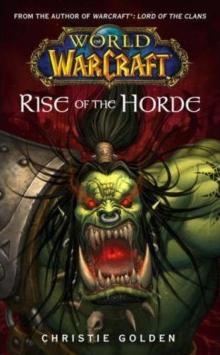 Rise of the Horde
Rise of the Horde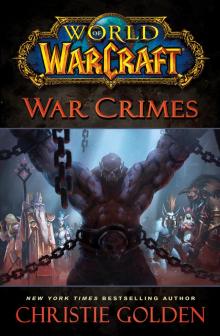 World of Warcraft: War Crimes
World of Warcraft: War Crimes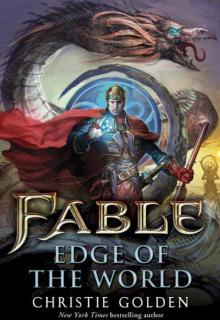 Fable: Edge of the World
Fable: Edge of the World Homecoming
Homecoming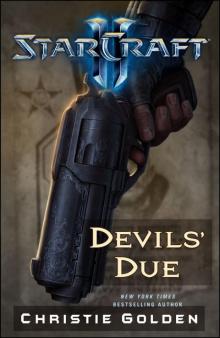 StarCraft II: Devil's Due
StarCraft II: Devil's Due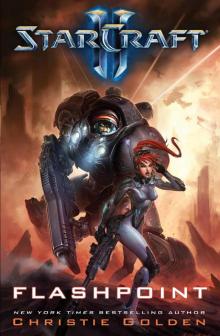 Starcraft II: Flashpoint
Starcraft II: Flashpoint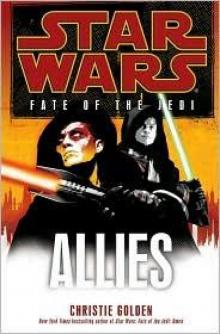 Allies
Allies Shadow Hunters
Shadow Hunters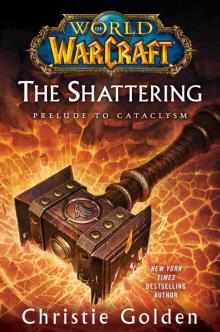 The Shattering: Prelude to Cataclysm wowct-1
The Shattering: Prelude to Cataclysm wowct-1 STAR TREK: VOY - Homecoming, Book Two - The Farther Shore
STAR TREK: VOY - Homecoming, Book Two - The Farther Shore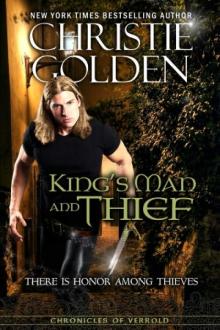 King's Man and Thief
King's Man and Thief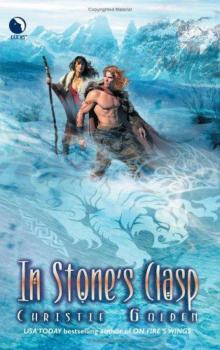 In Stone's Clasp
In Stone's Clasp Jaina Proudmoore: Tides of War
Jaina Proudmoore: Tides of War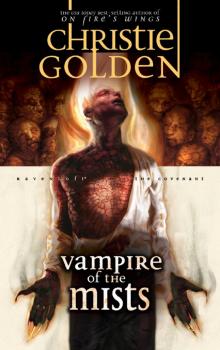 Vampire of the Mists
Vampire of the Mists Star Wars: Fate of the Jedi II: Omen
Star Wars: Fate of the Jedi II: Omen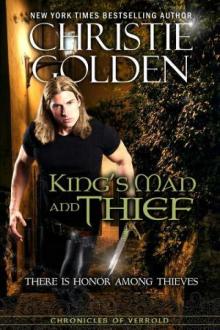 King's man and thief cov-2
King's man and thief cov-2 Star Trek
Star Trek StarCraft: Dark Templar: Twilight
StarCraft: Dark Templar: Twilight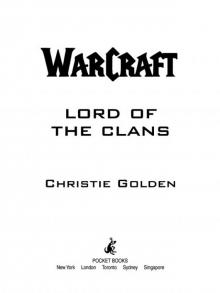 Lord Of The Clans
Lord Of The Clans ARKTIKA.1 (Short Story)
ARKTIKA.1 (Short Story)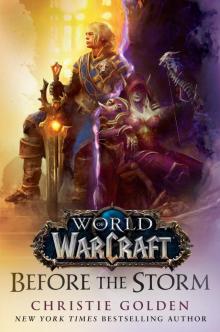 Before the Storm
Before the Storm STAR TREK: VOY - Homecoming, Book One
STAR TREK: VOY - Homecoming, Book One Shadow of Heaven
Shadow of Heaven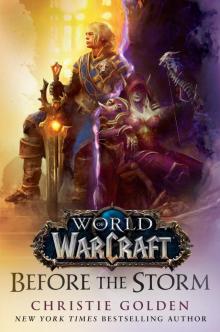 Before the Storm (World of Warcraft)
Before the Storm (World of Warcraft) Warcraft Official Movie Novelization
Warcraft Official Movie Novelization Flashpoint
Flashpoint STAR TREK: The Original Series - The Last Roundup
STAR TREK: The Original Series - The Last Roundup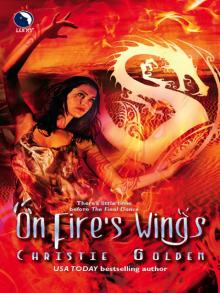 On Fire’s Wings
On Fire’s Wings Spirit Walk, Book One
Spirit Walk, Book One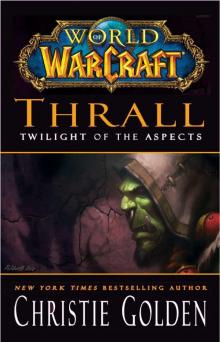 Thrall Twilight of the Aspects
Thrall Twilight of the Aspects Valerian and the City of a Thousand Planets
Valerian and the City of a Thousand Planets Warcraft
Warcraft Assassin's Creed: Heresy
Assassin's Creed: Heresy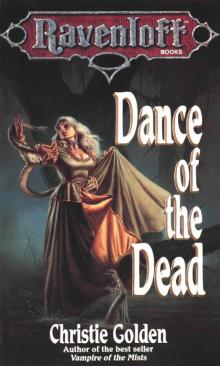 Dance of the Dead
Dance of the Dead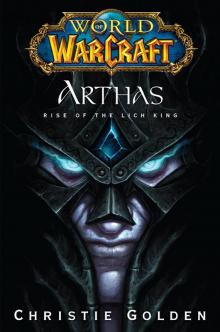 Arthas: Rise of the Lich King wow-6
Arthas: Rise of the Lich King wow-6 Assassin's Creed: The Official Movie Novelization
Assassin's Creed: The Official Movie Novelization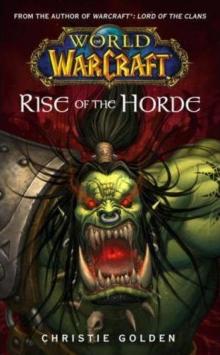 Rise of the Horde wow-2
Rise of the Horde wow-2 Dark Disciple
Dark Disciple Ghost Dance
Ghost Dance The Shattering
The Shattering Spirit Walk, Book Two
Spirit Walk, Book Two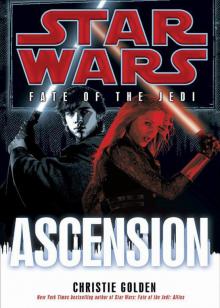 Star Wars: Fate of the Jedi: Ascension
Star Wars: Fate of the Jedi: Ascension Star Wars: Fate of the Jedi V: Allies
Star Wars: Fate of the Jedi V: Allies The Enemy Within
The Enemy Within Kindred Spirits
Kindred Spirits The Farther Shore
The Farther Shore Star Trek: Hard Crash (Star Trek: Starfleet Corps of Engineers Book 3)
Star Trek: Hard Crash (Star Trek: Starfleet Corps of Engineers Book 3) Twilight
Twilight